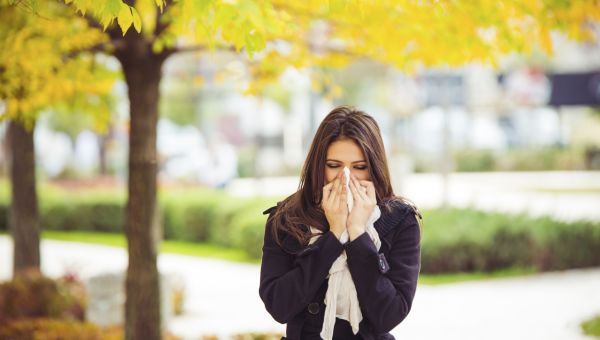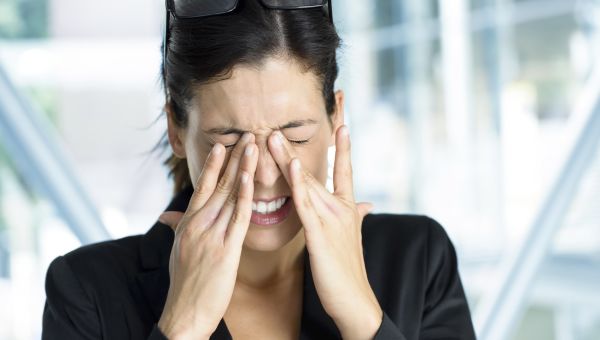About half of all Americans experience a headache at least once a month. Whether it’s a migraine or a tension headache, the symptoms can interfere with your life, taking your time away from the things that matter most.

Getty Image
“To avoid a serious headache, try to treat the pain as soon as you feel it coming on,” says Lisa Nocera MD, an anesthesiologist and pain specialist at St. Mary Medical Center in Langhorne, Pennsylvania. “The longer you let the pain build, the harder it will be to get your headache under control.”
Here’s what your headache could be telling you, plus tips for easing the pain.

Getty Image
Migraines are severe, throbbing headaches that are three times more common in women than in men. Migraines have many triggers, says Dr. Nocera. Allergies to foods like chocolate or a flavor enhancer called MSG, your period, stress and exhaustion all can cause this type of headache. Migraines are often more painful on one side of your head and may include:
Nausea, vomiting
Sensitivity to lights or sounds
Blurred vision
To learn the cause of your migraines, keep a headache calendar, recommends Nocera. Write down what you did and ate the day of each attack, as well as any medications you took. Then, talk to your healthcare provider (HCP) about your triggers and treatment options.

Getty Image
Ever wonder why you get a grueling headache at the same time each month? “Menstrual headaches are caused by a drop in the hormone estrogen, which occurs at the start of your period,” explains Nocera.
During the week leading up to your period, you may be able to keep headaches at bay with these habits:
Stick to a regular schedule of 7 to 8 hours of sleep each night
Keep your blood sugar stable by eating breakfast and snacking on protein-rich foods throughout the day
Stay hydrated
If your symptoms don’t improve with over the counter meds or lifestyle changes, your healthcare provider may recommend hormone treatments as well.

Getty Image
The Red Wine Headache (RWH) is a medical mystery that’s had scientists scratching their heads for centuries. “We’re not sure what causes the RWH,” says Nocera. “Some thoughts are that it’s caused by natural compounds like the sulfites, histamines or tannins that are found in red wine.”
Since each red has different amounts of these ingredients, you may be able to find a bottle that gives you that warm, fuzzy feeling—without the head-splitting aftermath.
Red wines that spend less time in oak barrels like Beaujolais Nouveau tend to have fewer tannins and histamines. You could also try a sulfite-free wine or a healthy wine substitute.

Getty Image
Headaches can strike at the worst possible time … sex headaches tend to be sudden, unpredictable and intense—often happening right at the moment of orgasm.
Sex headaches have a number of possible causes, says Nocera. Stress or the physical activity that’s involved in sex can play a role. Other causes may include:
The spikes in blood pressure and heart rate that happen with orgasms
Muscle tension
Triggers in your environment like scented candles or perfume
Tell your healthcare provider if you get sex headaches because they can signal more serious conditions like a type of stroke. Also, your HCP might be able to help: certain meds can prevent headaches if taken prior to sex.

Getty Image
They’re the most common type of headache. That’s probably because everyday, workplace stressors tend to bring them on. Tension headaches are associated with:
Holding your head in one position for too long, like when at a computer
Eye strain
Stress or exhaustion
Drinking too much caffeine
“If you get tension headaches at work, try moving your computer right into your direct line of vision,” recommends Nocera. “Make sure it’s centered and straight ahead, so you’re not looking down all the time.” Better posture can help ease the strain and muscle tension that often leads to tension headaches.

Getty Image
Headaches in the sinus area—or the front of your head, above or around your nose—are often caused by migraines rather than any kind of sinus problem. But in some cases, a sinus infection or a stuffed nose from allergies can cause this type of headache.
“It can be difficult for people to tell the difference between sinus headaches and migraines,” says Nocera. It might be a sinus infection if you have pain in the front of your head that:
Doesn’t get better with allergy medicine or decongestants
Doesn’t go away after about two weeks
If it is a sinus infection, your healthcare provider may recommend antibiotics and decongestants.

Getty Image
YOU COULD HAVE A RARE, BUT SERIOUS CONDITION
“Cluster headaches are rare,” says Nocera. “Less than one in 1,000 people experience them.” However, when cluster headaches do strike, the feeling is often described as "the worst pain known to medicine."
Like their name suggests, they come in clusters. They may happen every day for a number of weeks or as often as multiple times a day. The pain is usually worst behind one eye and tends to be a stabbing, excruciating pain.
Treatment includes powerful prescription drugs and oxygen therapy. Studies are also underway to learn if psychedelic drugs like LSD might help with cluster headaches since current meds may not work for every person.
Share...
No comments:
Post a Comment